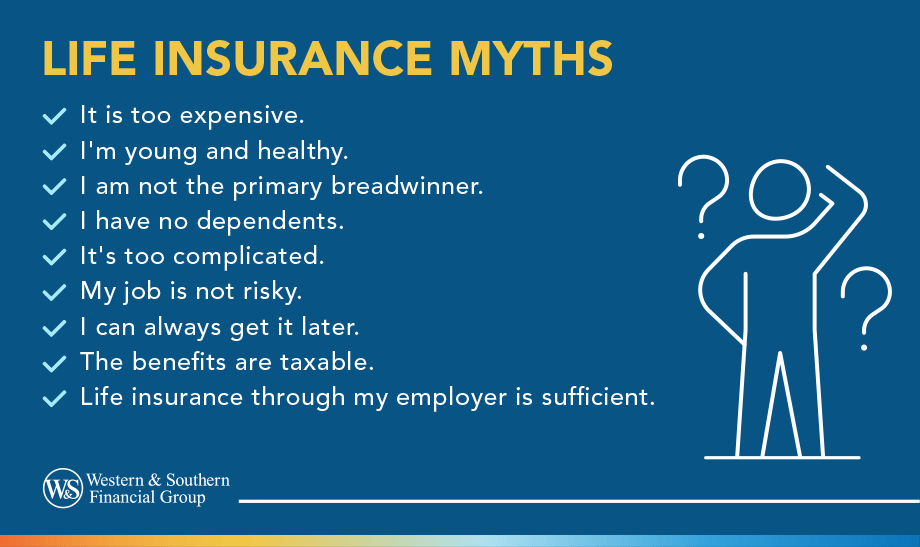

Key Takeaways
- Life insurance is often more attainable than people expect, especially for younger and healthier applicants who tend to overestimate costs.
- Buying coverage earlier can lock in lower premiums and help provide financial protection long before major life changes happen.
- Life insurance isn’t just for primary earners, since stay-at-home parents, secondary earners, and even single adults still have financial responsibilities.
- Relying only on employer-provided coverage can leave gaps, making an individual policy a smart way to add more dependable protection.
- Life insurance is usually easy to get and death benefits are generally paid tax-free to beneficiaries.
Life insurance is often surrounded by misconceptions that prevent individuals from making informed decisions about their financial security. Many myths can lead to underestimating the value of life insurance or misjudging its importance in a comprehensive financial strategy.
Learn more about the most common myths about life insurance, offering clarity and highlighting the benefits of having an appropriate policy in place.
Myth 1: “Life Insurance Is Too Expensive.”
Many people assume life insurance costs more than it does. In reality, it can be more attainable for many households.
According to the 2025 LIMRA Insurance Barometer Study, Americans - especially younger adults - often overestimate the cost of life insurance by 10 to 12 times the actual amount.1 For example, a healthy 30-year-old non-smoker female can get a 20-year, $500,000 term life insurance policy for about $20 to $30 monthly.
Life insurance costs vary based on age, health, and coverage amount. By comparing policies and providers, many people can find an option that fits their budget. When viewed as part of a broader financial plan rather than an extra expense, life insurance can help protect loved ones without adding financial strain.
Myth 2: “I Don’t Need Life Insurance Because I’m Young and Healthy.”
Life insurance isn’t only for older adults or people with health issues. Buying coverage while you’re young and healthy can lock in lower premiums since rates are based on age and health at the time you apply.
A recent article found that nearly 29% of millennials regret not purchasing life insurance earlier, with many buying coverage later - around age 27 - and wishing they had secured lower rates when they were younger.2
Life insurance also goes beyond end-of-life planning. It can help protect your loved ones from financial strain if something unexpected happens.
Life insurance can help cover:
- Unpaid debts
- Funeral and final expenses
- Other immediate financial obligations
Accidents and sudden illnesses can happen at any age. Planning ahead can offer long-term financial protection for your family and help reduce economic stress during an already difficult time.
Myth 3: “Only the Primary Breadwinner Needs Life Insurance.”
Life insurance isn’t only for the primary breadwinner. Stay-at-home parents and secondary earners also provide real economic value to a household. Replacing their services could be substantial if something were to happen to them.
Stay-at-home parents contribute through unpaid labor that would be costly to replace. As of early 2026, the estimated annual value of a stay-at-home parent’s work ranges from $42,946 to $52,610.3
Secondary earners also support a household’s finances, either through income or by allowing the primary earner to work more hours.
Covering all contributing household members with life insurance helps protect a family’s financial stability and address potential gaps if any contribution is lost.
Myth 4: “Life Insurance Through My Employer Is Sufficient.”
Many people assume employer-provided life insurance is enough, but that isn’t always the case. Most workplace policies offer coverage equal to one or two times your annual salary. While that may sound adequate, it often falls short when factoring in long-term expenses, such as:
- Mortgage payments
- Children’s education
- Ongoing household and living costs
Another limitation is portability. Employer-provided life insurance is usually tied to your job. If you leave or are laid off, that coverage may end, potentially leaving your family without protection.
For these reasons, pairing workplace coverage with an individual life insurance policy can help ensure broader, more reliable protection.
Myth 5: “Life Insurance Is Only for People With Dependents.”
Life insurance isn’t just for people with children or spouses. It can be useful regardless of your family situation.
It can help by:
- Covering outstanding debts: Policies can help pay off obligations like a mortgage or student loans, reducing the financial burden on family members or co-signers.
- Handling end-of-life costs: Funeral, burial, and cremation expenses add up. In the U.S., the average funeral costs between $7,800 and $8,300.4
- Providing financial flexibility: Some policies build cash value over time, which you may be able to borrow against or withdraw from if needed.
If you’re young and healthy, premiums are typically lower. Overall, life insurance isn’t only about dependents - it can be a flexible tool within a well-rounded financial strategy.
Lock in lower premiums now and avoid future regrets. Request a Free Life Insurance Quote
Myth 6: “It’s Too Complicated To Get Life Insurance.”
Getting life insurance is often simpler than people expect. Today’s process is more straightforward thanks to online tools and improved customer support.
What makes it easier:
- Online quotes from many life insurance companies
- Simple application processes
- Quick access to customer support
Choosing the right life insurance company also matters. You can compare policies and providers to find coverage that fits your needs and budget. A life insurance agent can help explain different policy types and guide you through your options.
With the right resources, you can move through the process confidently without feeling overwhelmed.
Myth 7: “Life Insurance Is Only Necessary if You Have a Risky Job.”
Life insurance isn’t just for people in high-risk occupations. It’s relevant for anyone with dependents or financial responsibilities.
Whether you’re a teacher, office worker, or single parent, coverage can help your family manage financially if you’re no longer there to provide income.
As mentioned earlier, life insurance can help cover:
- Mortgage or rent payments
- Education costs
- Everyday living expenses
Life insurance replaces lost income, which makes it important for workers across all professions - not just those in dangerous jobs. In fact, about 30% of U.S. households would face serious financial hardship within one month of losing a primary income earner.5 That gap shows why coverage plays an important role in supporting a family’s financial stability.
Myth 8: “I Can Always Get Life Insurance Later.”
Many people assume they can wait to buy life insurance until they’re older or until their health changes. That assumption can be costly.
As you age, life insurance premiums typically increase because insurers view older applicants as higher risk. Health conditions can also develop unexpectedly, which may make coverage more expensive - or in some cases, unavailable. In fact, 35% of people say they wish they had purchased life insurance sooner.
Why waiting can be a problem:
- Higher premiums as you get older
- Health changes that affect eligibility
- The possibility of being denied coverage
Buying life insurance earlier, while you’re younger and healthier, can help lock in lower costs and make approval easier.
Myth 9: “Life Insurance Benefits Are Taxable.”
In most cases, life insurance benefits are not taxable. When someone with a life insurance policy dies, the beneficiary generally doesn’t owe income tax on the payout. According to the IRS, life insurance proceeds paid after death are typically not considered taxable income.6
That said, there are a few exceptions to be aware of:
- Installment payouts: If benefits are paid over time, any interest earned on those payments may be taxable.
- Estate taxes: If the policyholder’s estate is large enough to owe estate taxes, life insurance proceeds may be included in the taxable estate.
While these exceptions are limited, life insurance is often an effective way to provide financial support to loved ones without creating additional tax burdens.
Conclusion
Clearing up common life insurance myths helps people understand its real value in a financial strategy. Life insurance does more than cover end-of-life expenses. It can also provide financial support during unexpected events and long-term help for loved ones. By understanding life insurance and its purpose, individuals can make informed choices that help protect their family’s financial well-being.
Don't let myths hold you back—add a life insurance policy for complete coverage. Request a Free Life Insurance Quote
Frequently Asked Questions
Do life insurance companies often refuse to pay claims?
Do beneficiaries have to wait months or years to get paid?
Does life insurance automatically go through probate?
Can you have multiple life insurance policies at once?
Do you always need a medical exam to qualify?
Sources
- Adults Age 30 and Younger Overestimate Life Insurance Cost by 10–12 Times. https://www.limra.com/en/newsroom/news-releases/2025/adults-age-30-and-younger-overestimate-life-insurance-cost-by-1012-times/.
- Why Millennials Buying Life Insurance? Top Reasons. https://beinsure.com/why-millennials-buy-life-insurance/.
- Stay At Home Mom Salary. https://www.salary.com/research/salary/recruiting/stay-at-home-mom-salary.
- Statistics. https://nfda.org/news/statistics.
- Life Insurance Statistics in the US 2025 | Facts about Life Insurance. https://www.theglobalstatistics.com/united-states-life-insurance-statistics/.
- Life insurance & disability insurance proceeds. https://www.irs.gov/faqs/interest-dividends-other-types-of-income/life-insurance-disability-insurance-proceeds.

















































